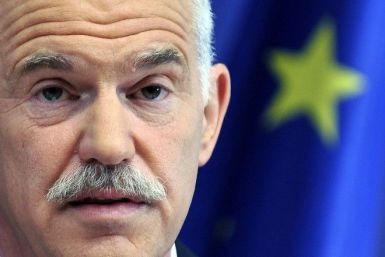Greece insisted on Tuesday any restructuring of its debts would be a disaster for the economy, but financial markets continue to view it as likely and are betting that the euro zone debt crisis will worsen.
Two German government advisers see a debt restructuring by Greece as inevitable while two of the overborrowed country's ministers continued to rule it out in newspaper interviews on Saturday.
Portugal may get more leeway on its efforts to reduce the budget deficit under an EU/IMF bailout, a newspaper reported on Wednesday, after the prime minister vowed to protect the country from excessive austerity.
The budget deficit for cash-strapped Greece is even worse than previously thought, according revised data from the European Union’s statistical office, Eurostat.
The Gold Price recovered an overnight dip below $1500 per ounce in London on Tuesday, trading less than 1% shy of yesterday's new all-time high at $1518 as European stock markets rose together with major government bonds and energy prices.
The euro zone's overall budget gap fell last year but deficits in Greece and Portugal were higher than expected, underlining the challenges presented by their austerity programs.
Silver tumbled before finding a footing on Tuesday, dragging prices of gold and oil with it and subduing European shares, although investors were wary of taking strong positions ahead of a U.S. Federal Reserve policy meeting.
The euro has decoupled from the euro zone peripheral debt crisis in 2011.
US Treasuries are called the “risk-free assets” of the financial world. However, the moniker of “risk-free asset” may actually belong to another country.
After ignoring the worsening euro zone peripheral debt crisis for the last month, participants in the currencies market may finally be paying attention to it.
Real gross domestic product (GDP) growth in the United States will reaccelerate, and reach 3.5–4 percent in the second half of this year, IHS Global Insight said in its April World Flash report.
Spain will sell up to 3.5 billion euros in bonds on Wednesday in an auction that should give clues on whether it can avoid the bailout contagion that has engulfed the much smaller economies of Greece, Ireland and Portugal.
For over 70 years the United States has been widely considered AAA top-notch benchmark sovereign risk. Standard & Poor (S&P)'s decision to impose a negative outlook now puts this status under question for the first time, reflecting the unsustainable debt trajectory and risks of policy response gridlock.
[Selling silver short] natural with these giddy prices, one London trader told the Platts news service on Monday. Speculators are going to have to take profits soon. Shorts have been burned in the run-up, but keep coming back for more, he said, forecasting a $10 drop in the Silver Price short term.
Brent crude oil fell on Tuesday, slipping below $120 a barrel for the first time in two weeks, pressured by concern about the economic outlook and that high prices could erode demand.
Gold prices rallied to a record high $1,497.20 an ounce on Monday after Standard & Poor's downgraded its credit outlook for the United States and as investors worried about debt in the euro zone and inflation in China.
Oil fell more than $2 on Monday after ratings agency S&P cut its U.S. credit outlook to negative, adding to losses sparked by top exporter Saudi Arabia saying weak demand had forced it to reduce crude output.
Gold stayed above $1480 per ounce in Asian and European trading, and then experienced a sudden spike $15 upwards to new record prices yet again at the beginning of the New York trading session. Prices take support from worries over euro zone debt and inflation in Asia after China opted to raise reserve requirements again.
A crucial new phase of Portugal's bailout negotiations began under a cloud on Monday after an anti-euro party in Finland that has vowed to derail the pending rescue scored strong gains in an election.
The success of a far-right party in Finland’s general election may ultimately endanger the European Union’s (EU) financial bailout of Portugal.
The euro fell on Monday and stocks were weaker as the rise of a euro-skeptic party in Finland added another potential hurdle to solving the euro zone's debt problems.
Greece has no plans to restructure its debt and the International Monetary Fund is not considering a plan, the country's finance minister, George Papaconstantinou, said on Saturday.


















